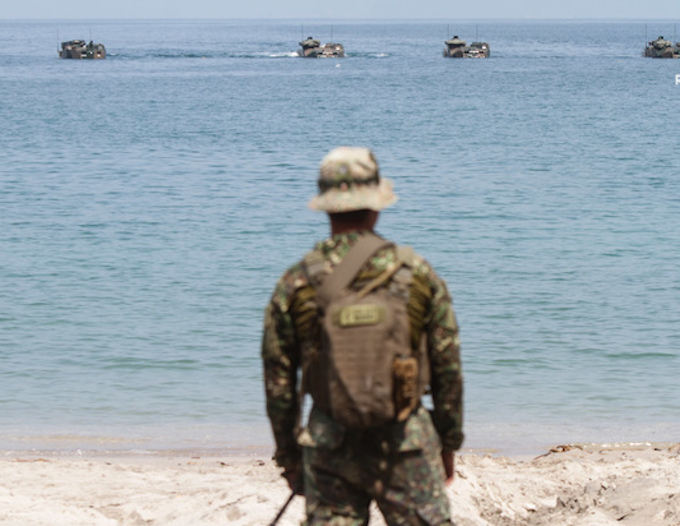
By JC Gotinga in Manila
After days of silence, Defence Secretary Delfin Lorenzana today finally made a public statement on the termination of the Visiting Forces Agreement (VFA) with the US, saying Philippine and American forces will cease to have joint exercises after the repeal takes effect in 180 days, or 6 months.
“With the formal serving of the notice of termination of the Visiting Forces Agreement, this year’s planned military exercises with the Americans shall proceed as scheduled within the 180 days that the VFA remains in force. However, our American counterparts may opt to discontinue the scheduled exercises before the 180 days are up,” Lorenzana said.
“Once the termination is final, we will cease to have exercises with them,” he added.
READ MORE: Timeline to terminating the VFA with the US
The Philippine and US militaries hold an average of 300 joint activities every year, many of them exercises and trainings meant to increase interoperability, or the familiarity that enables both sides to work seamlessly together.
Among those activities are the annual Balikatan exercises, set for May this year, which involves all of the Armed Forces of the Philippines’ (AFP) service branches: the Army, the Air Force, and the Navy, which includes the Marines.
Balikatan
This year’s Balikatan exercises fall within the 6-month interim following President Rodrigo Duterte officially ordered the repeal of the VFA on Tuesday, February 11.
The VFA states that its termination takes effect after 180 days of the issuance of a notice from either party.
Besides the Balikatan, major joint activities between the AFP and the US military include the Kamandag exercises of their marine corps, the MTA Sama-Sama involving their navies, the Salaknib exercises of the two armies, and the Bilateral Air Contingent Exercise between their air forces.
AFP generals have credited these trainings with the advancement of Filipino troops’ warfighting capabilities, and exposure to advanced technologies and assets. The US Armed Forces is among the most formidable militaries in the world.
On Monday, US Assistant Secretary of State for Political-Military Affairs R. Clarke Cooper told reporters that joint military exercises between the Philippines and the US would “be reduced or disappear” if the VFA were to end.
Easy entry
The VFA allows for the easy entry of US troops into the Philippines by waiving regular immigration requirements such as passports and visas for US servicemen and women on official business.
It also sets rules on the entry and movement of US assets, and jurisdiction and trial proceedings for US military members accused of crimes committed while in the Philippines.
Ending the VFA would entail a major drawdown of US military troops in the Philippines.
It may also affect the implementation of the 1951 Mutual Defence Treaty between the two countries, and their Enhanced Defence Cooperation Agreement on the placement of military troops and assets in certain Philippine bases.











































